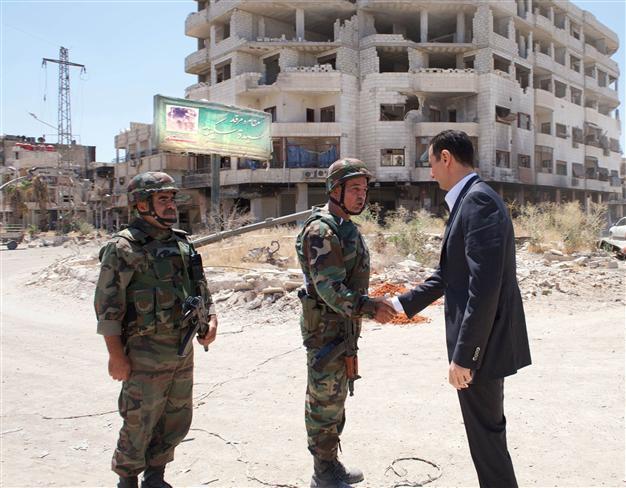Assad visits ex-rebel bastion near capital
BEIRUT - Reuters

Syria's President Bashar al-Assad (R) shakes hands with a military personnel during his visit to a military site at Darya area, on the occasion of the 68th anniversary of army day, in this handout photograph distributed by Syria's national news agency SANA on August 1, 2013. REUTERS Photo
Syrian President Bashar al-Assad made a visit on Thursday to the town of Daraya outside Damascus, a former rebel bastion now mainly under government control, state television reported.In his first known visit outside the capital since March 2012, "President Assad is currently inspecting a unit of our armed forces in Daraya on the occasion of Army Day," it said without airing immediate footage with its report.
Assad is rarely reported to have travelled outside the capital since an uprising against his rule erupted in March 2011.
The Daraya visit came as he sent an Army Day message to troops telling them he was "sure of victory" over rebel fighters.
The president's Facebook page carried a picture of Assad shaking hands with a soldier in what appeared to be a former battlezone.
Daraya, a mostly Sunni town, neighbours rebel districts south of Damascus.
In August 2012, rebels announced the discovery of more than 300 bodies in what they branded a massacre by Assad's forces. The tally later rose to more than 500, according to the opposition.
In March of last year, Assad visited Baba Amr, a former rebel bastion in the flashpoint central city of Homs.
Assad says sure he will defeat Syrian rebels
Syrian President Bashar al-Assad said on Thursday he was confident of victory against rebels in a devastating 28-month-old civil war that has killed more than 100,000 people and sent nearly two million fleeing abroad.
Insurgents have seized large swathes of territory, but Assad's forces have staged a counter-offensive in recent weeks, pushing them back from around the capital Damascus and retaking several towns near the border with Lebanon.
"If we were not sure that we were going to win in Syria, we would not have the ability to resist and the ability to continue fighting for more than two years against the enemy," state news agency SANA quoted Assad as saying.
Assad has framed the revolt against four decades of his family's rule as a foreign-backed conspiracy fought by Islamist "terrorists." When pro-democracy protests started in March 2011, a military crackdown eventually led to an armed insurrection.
Addressing officers on the 68th anniversary of the Syrian army's creation, Assad said soldiers had shown "courage in the face of terrorism ... and the fiercest barbaric war in modern history".
U.N. investigators say Assad's forces have carried out war crimes including unlawful killing, torture, sexual violence, indiscriminate attack and pillaging in what appears to be a state-directed policy. They say rebels have also committed war crimes, including executions, but on a lesser scale.
The struggle in Syria has become markedly sectarian, broadly pitting majority Sunni Muslim rebels and against Assad's minority Alawite sect, which is an offshoot of Shi'ite Islam.
Assad has relied on Alawite-led army units and security forces from the start, but has turned increasingly to loyalist militia armed and funded by Damascus to fight the rebels.
He has also received solid support from Shi'ite regional powerhouse Iran, Lebanon's Hezbollah movement and longtime ally Russia, while his fragmented foes have received little military aid from their Western backers wary of the growing presence of hardline Islamist rebel groups, some of them linked to al Qaeda.
















